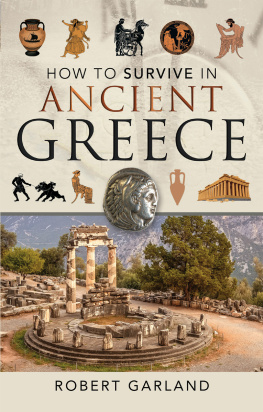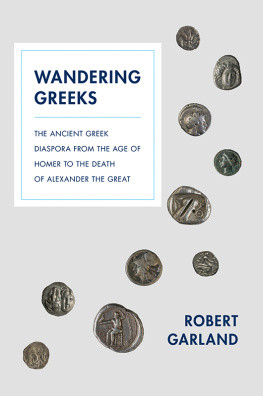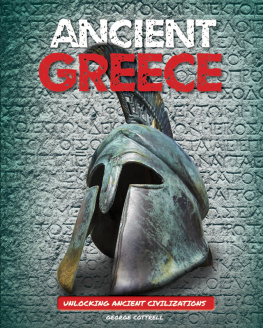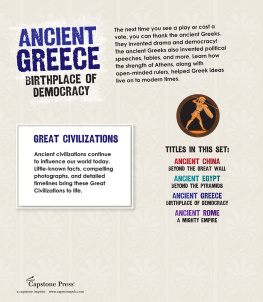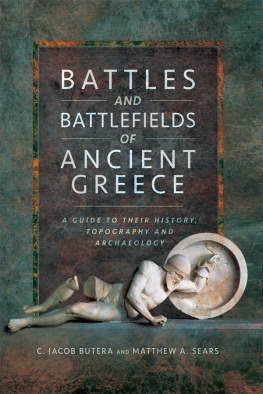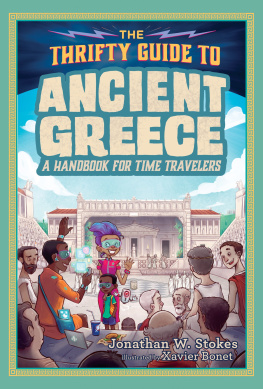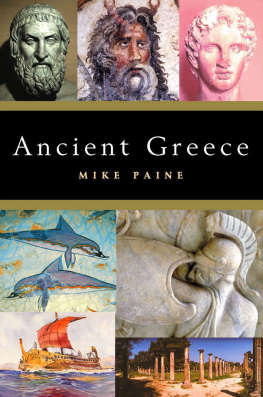Pagebreaks of the print version

HOW TO SURVIVE IN
ANCIENT GREECE
For Richard and Danielle with love
HOW TO SURVIVE IN
ANCIENT GREECE
A N EXPAT S GUIDE TO LIVING IN C LASSICAL A THENS (490-323 BCE)
ROBERT GARLAND
First published in Great Britain in 2020 by
PEN AND SWORD HISTORY
An imprint of
Pen & Sword Books Ltd
Yorkshire Philadelphia
Copyright Robert Garland, 2020
ISBN 9781526754707
ePUB ISBN 9781526754714
Mobi ISBN 9781526754721
The right of Robert Garland to be identified as Author of this work has been asserted by him in accordance with the Copyright, Designs and Patents Act 1988.
A CIP catalogue record for this book is available from the British Library.
All rights reserved. No part of this book may be reproduced or transmitted in any form or by any means, electronic or mechanical including photocopying, recording or by any information storage and retrieval system, without permission from the Publisher in writing.
Pen & Sword Books Limited incorporates the imprints of Atlas, Archaeology, Aviation, Discovery, Family History, Fiction, History, Maritime, Military, Military Classics, Politics, Select, Transport, True Crime, Air World, Frontline Publishing, Leo Cooper, Remember When, Seaforth Publishing, The Praetorian Press, Wharncliffe Local History, Wharncliffe Transport, Wharncliffe True Crime and White Owl.
For a complete list of Pen & Sword titles please contact
PEN & SWORD BOOKS LIMITED
47 Church Street, Barnsley, South Yorkshire, S70 2AS, England
E-mail:
Website: www.pen-and-sword.co.uk
Or
PEN AND SWORD BOOKS
1950 Lawrence Rd, Havertown, PA 19083, USA
E-mail:
Website: www.penandswordbooks.com
Acknowledgements
I wish to express my deep appreciation of the dear friends who have helped me to see the many ways in which history is inescapably present: Tony Aveni, Peter Balakian, Stan Brubaker, Paul Cartledge, Susan Dyer, Pat Easterling, Kiko Galvez, Mike Goldmark, Emma Greensmith, Graham Hodges, Sir Fergus Millar, Jon Mikalson, Alice and Sasha Nakhimovsky, John Naughton, Alan Swensen, David Whitehead, Robert Wilson, and as ever with gratitude to Sir Mick Jagger.
Introduction
How to Survive in Ancient Greece is not a history book in the conventional sense of the word. Its asking you to imagine that you suddenly find yourself transported back in time and place and discover a landscape for which you are completely unprepared. What do you need to know in order to survive? What will look vaguely familiar? What will seem radically different? What kind of people will you encounter? How will you expect them to interact with you and you with them? What work will be available? How will you relax? What will you do if you become sick? How will you fit in? Can you fit in? That last decision, of course, is yours and yours alone. History at its best is always about imagining a past world. This book invites you to take an active role in bringing to life the world of Ancient Greece and placing yourself squarely within it.
The world you are going to enter is that of late-fifth century Athens. Ive chosen this period because it was one of the greatest moments of human achievement and is very well documented. The year is 420 BCE, when Athens and Sparta are enjoying an uneasy peace. At the time you arrive Athens manpower is getting back up to strength after a devastating plague, she rules a maritime empire that dominates the eastern Mediterranean, she has invested more faith in the judgement of the common man than any society before or since, Sophocles and Euripides are writing tragedies that will stir and provoke audiences 2,400 years later, medical science is advancing, Socrates is getting a lot of peoples backs up by telling them they need to rid themselves of all their unexamined opinions, and the Parthenon, the greatest Greek temple ever built, crowns the . In short, human excellence has reached a peak. You might not want to stay too long, however, for five years later Athens will take a decision that will set her on a downward spiral, ultimately leading to her total defeat at the hands of Sparta and her allies.
Since this isnt a conventional history book, Ive taken one or two liberties with time in the interests of, well, interest. For instance, Ive commandeered Aristotle as an occasional witness, even though he was born a generation later, both because I thought youd want to hear from him and because what he says is representative of some widely held beliefs, not least regarding women.
Ive tried to provide as much information about what to expect when you arrive, irrespective of your gender and age. Its fair to say, however, that if youre a female, youre going to have to make a bigger adjustment to life in ancient Greece than you will if youre a male.
Travelling back in time requires a big mental as well as physical adjustment, and Ive done my best to prepare you for both. Thats why Ive included a number of interviews with Greeks from different walks of life and different places, hoping that these will help you to see the world from their perspective and further prepare you for what to expect.
Timeline
All dates are BCE unless otherwise indicated.
c.1200 The Trojan War takes place?
594-3 Solon, sometimes called the Father of Democracy, introduces constitutional, economic and social reforms in Athens.
508-507 Cleisthenes, also sometimes called the Father of Democracy, introduces administrative changes that lead Athens further down the road to democracy.
The Athenian infantry victory over the Persians at the Battle of Marathon conventionally marks the beginning of the era.
The Athenians discover a rich vein of silver in and on the recommendation of a leading politician called Themistocles begin building a large fleet with the proceeds.
The Persians under King Xerxes invade Greece. Some 300 Spartans, together with a force of , die opposing the Persians at Thermopylae in northern Greece. Mostly due to the Athenians, who contribute the largest number of ships, the Greek fleet defeats the Persians at the Battle of Salamis off the coast of Attica.
The Persians abandon their invasion after suffering a defeat at the hands of a combined Greek army at the Battle of Plataea in central Greece.
Greek states under the leadership of Athens form an alliance against Persia known as the Delian Confederacy, thereby laying the foundations for what will later become the Athenian Empire.
An earthquake in Sparta prompts its slaves, known as helots, to revolt.
A largely peaceful political revolution moves Athens towards radical democracy.
Aeschylus trilogy, Oresteia , wins first prize at the festival.
At the suggestion of Pericles, the Athenians pass a resolution to rebuild the temples on the Acropolis burned down by the Persians.
The Peloponnesian War, fought between the Athenians and their allies and the Spartans and their allies, breaks out. The Spartan king, Archidamus, undertakes a series of annual invasions of Attica.
430-29 Athens is ravaged by a plague, resulting in the evacuation of its rural population inside the city walls.
The Athenians capture 290 Spartans on the island of Sphacteria in the southern , thereby forcing the Spartans to abandon their annual invasions of Attica.
Athens and Sparta make peace.
Athens dispatches an expedition to conquer Sicily.
The Sicilian expedition is wiped out by the Syracusans and all the surviving Athenians are taken prisoner. Soon afterwards Sparta resumes hostilities against Athens.

